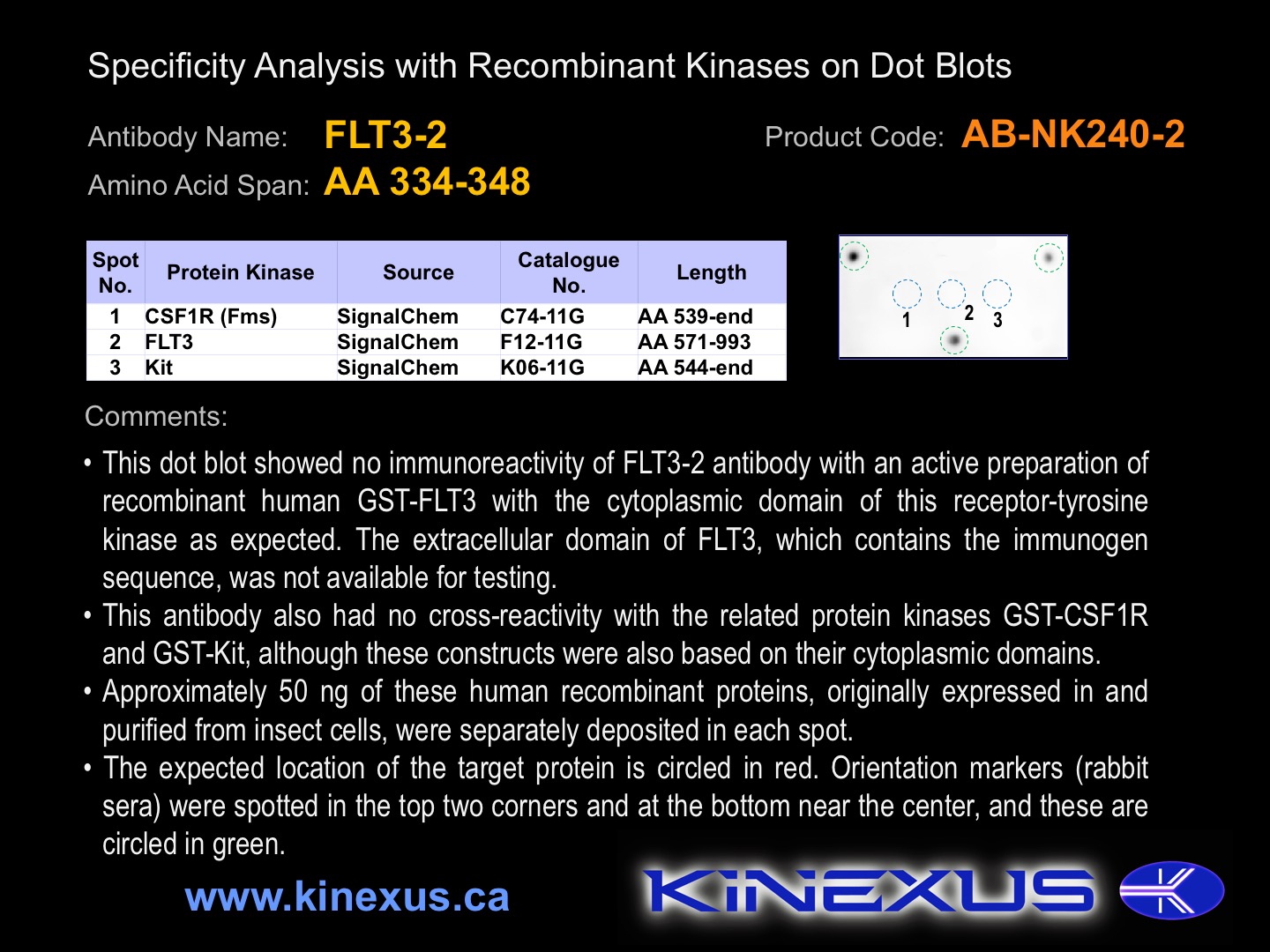Product Name: Flt3-2
Product Number: AB-NK240-2
| Size: | 25 µg | Price: | 89.00 | |
| $US |
Target Full Name: Fetal liver fms-related tyrosine kinase 3; Receptor-type tyrosine-protein kinase Flt3
Target Alias: CD135; Fetal liver kinase 2; FL cytokine receptor; FLK2; FLK-2; Flt-3; Fms-related tyrosine kinase 3; Kinase Flt3; STK-1; RP11-153M24_3; CD135; STK1; FLK2; ENSG00000122025
Product Type Specific: Protein kinase pan-specific antibody
Antibody Code: NK240-2
Antibody Target Type: Pan-specific
Protein UniProt: P36888
Protein SigNET: P36888
Antibody Type: Polyclonal
Antibody Host Species: Rabbit
Target Alias: CD135; Fetal liver kinase 2; FL cytokine receptor; FLK2; FLK-2; Flt-3; Fms-related tyrosine kinase 3; Kinase Flt3; STK-1; RP11-153M24_3; CD135; STK1; FLK2; ENSG00000122025
Product Type Specific: Protein kinase pan-specific antibody
Antibody Code: NK240-2
Antibody Target Type: Pan-specific
Protein UniProt: P36888
Protein SigNET: P36888
Antibody Type: Polyclonal
Antibody Host Species: Rabbit
Antibody Immunogen Source: Human Flt3 (STK1) sequence peptide Cat. No.: PE-01AUK85
Antibody Immunogen Sequence: CKHPSQSALVTIVEKG
Antibody Immunogen Description: Corresponds to amino acid residues K334 to G348
Antibody Immunogen Sequence: CKHPSQSALVTIVEKG
Antibody Immunogen Description: Corresponds to amino acid residues K334 to G348
Production Method: The immunizing peptide was produced by solid phase synthesis on a multipep peptide synthesizer and purified by reverse-phase hplc chromatography. Purity was assessed by analytical hplc and the amino acid sequence confirmed by mass spectrometry analysis. This peptide was coupled to KLH prior to immunization into rabbits. New Zealand White rabbits were subcutaneously injected with KLH-coupled immunizing peptide every 4 weeks for 4 months. The sera from these animals was applied onto an agarose column to which the immunogen peptide was thio-linked. Antibody was eluted from the column with 0.1 M glycine, pH 2.5. Subsequently, the antibody solution was neutralized to pH 7.0 with saturated Tris.
Antibody Modification: Unconjugated. Contact KInexus if you are interest in having the antibody biotinylated or coupled with fluorescent dyes.
Antibody Concentration: 0.5 mg/ml
Antibody Modification: Unconjugated. Contact KInexus if you are interest in having the antibody biotinylated or coupled with fluorescent dyes.
Antibody Concentration: 0.5 mg/ml
Storage Buffer: Phosphate buffered saline pH 7.4, 0.05% Thimerasol
Storage Conditions: For long term storage, keep frozen at -40°C or lower. Stock solution can be kept at +4°C for more than 3 months. Avoid repeated freeze-thaw cycles.
Product Use: Western blotting | Antibody microarray
Antibody Dilution Recommended: 2 µg/ml for immunoblotting
Antibody Species Reactivity: Human
Antibody Positive Control: The observed molecular mass of the processed target protein on SDS-PAGE gels is reported to be around 120-130, 165-175 kDa.
Antibody Specificity: High
Antibody Cross Reactivity: No immunoreactivity on protein dot blots with recombinant human CSF1R and Kit.
Storage Conditions: For long term storage, keep frozen at -40°C or lower. Stock solution can be kept at +4°C for more than 3 months. Avoid repeated freeze-thaw cycles.
Product Use: Western blotting | Antibody microarray
Antibody Dilution Recommended: 2 µg/ml for immunoblotting
Antibody Species Reactivity: Human
Antibody Positive Control: The observed molecular mass of the processed target protein on SDS-PAGE gels is reported to be around 120-130, 165-175 kDa.
Antibody Specificity: High
Antibody Cross Reactivity: No immunoreactivity on protein dot blots with recombinant human CSF1R and Kit.
Related Product 1: Flt3-2 blocking peptide
Related Product 2: Flt3-1 pan-specific antibody (Cat. No.: AB-NK240-1)
Related Product 2: Flt3-1 pan-specific antibody (Cat. No.: AB-NK240-1)
Scientific Background: Flt3 (FLK2) is a protein-tyrosine kinase of the TK group and PDGFR family. It is involved in cell proliferation, differentiation and survival through the binding of its ligand, Flt3LG. Autophosphorylation of Y591 increases phosphotransferase activity. Autophosphorylation of Y599 increases phosphotransferase activity and induces interaction with SHP2 and Src. Flt3 will induce phosphorylation of Shc1 and Akt1 leading to a change in the downstream regulator mTOR. It can activate the Ras signalling pathway and lead to phosphorylation of downstream kinases such as MAPK1/ERK2 and MAPK3/ERK1. Mutations causing constitutive activity promote cell proliferation and resistance to apoptosis. Defects have been associated with acute myelogenous leukemiaFlt3 is a known oncoprotein (OP). Cancer-related mutations in human tumours point to a gain of function of the protein kinase. The active form of the protein kinase normally acts to promote tumour cell proliferation. Flt3 is linked with Acute Myeloid Leukemia (AML), Juvenile Myelomonocytic Leukemia (JMML), Myelodysplastic Syndromes (MSD), Acute Promyelocytic Leukemia, Myeloid Sarcoma, Chronic Myeloproliferative Disease (CMPD), Acute Biphenotypic Leukemia (BAL), Precursor T-Cell Acute Lymphoblastic Leukemia, Leukemia, Acute Lymphoblastic 3 (B-ALL), Acute Myeloblastic Leukemia with Maturation, Minimally Differentiated Acute Myeloblastic Leukemia is a subtype of AML, and Gastrointestinal Stromal tumour (GANT). STAT5A activation involves Y589 and Y591 phosphorylation. A Y599F mutation can interrupt Flt3 complex formation with PTPN11/SHP2.
© Kinexus Bioinformatics Corporation 2017


